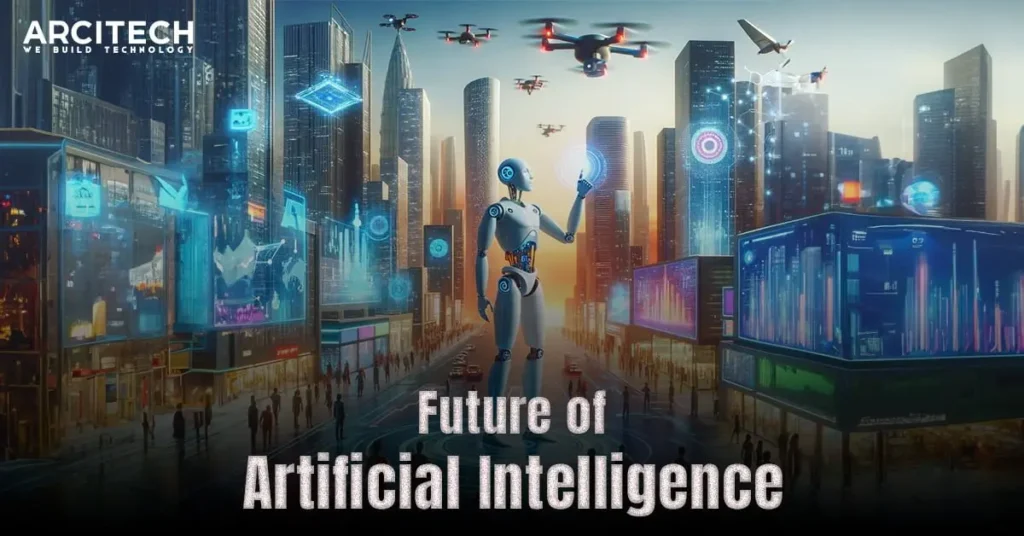Introduction
Artificial Intelligence has evolved into a mentor, companion, and more for individuals globally. With the capacity to answer nearly any query and the skill to ‘think’, it’s remarkably aced various tests designed to assess human cognition and reasoning. The AI revolution has arrived! But the question remains: will it endure, or will a new human invention surpass it? Discover the anticipated future of AI across various domains in this article.
“ AI is one of the most important things humanity is working on. It is more profound than electricity or fire. “
Sundar Pichai, CEO of Google
Future of AI: How It Was Viewed and Predicted 10 Years Ago.
The idea of AI has been capturing the imagination of people for a long time, way before we even had a name for it. It was both exciting and a bit scary to think about making machines that were like us. We often thought that smart machines had to look human, but actually, AI was already doing great things. For example, AI was better than humans at chess (Hsu, 2002), the game Go (Silver et al., 2016), and translating languages (Wu et al., 2016), and these were big news. But even before these, AI had been used in industries since the 1980s.
Back then, AI systems called “expert” or rule-based systems were used for things like checking circuit boards and spotting credit card fraud. Also, machine learning, which includes methods like genetic algorithms, was used to solve tough problems like planning schedules. And neural networks, which try to work like human brains, were used for understanding how we learn and for important jobs in industry like control and monitoring.
The 1990s brought a big change in machine learning with new methods like probabilistic and Bayesian approaches. These laid the groundwork for the AI tools we use a lot today, like going through huge amounts of data. This meant that people could search and make sense of billions of web pages just by typing a few words. (Lowe, 2001; Bullinaria and Levy, 2007).
Looking back, we can see that AI has come a long way and has achieved a lot, sometimes even before we realized what the future could hold.
Recent Technology Advancements in AI
AI is moving forward fast. Every day, there are new discoveries and uses in things like robots. Learning machines, and how computers see and understand pictures. This means less work for humans, as machines are doing more of the tasks. The biggest changes are happening in many areas, like healthcare, coding, learning, money matters, building, getting around, fun activities, law, buying and selling houses, exploring space, and shopping.
These new steps in AI are making it more automatic, changing how AI and people will work together in the future. With this, there will be more risks to keeping data safe and new questions about what’s right and wrong, which will need new rules.
Even with these challenges about ethics and data safety. AI is set to make big changes in all areas, bringing new chances and hurdles. As robots and AI handle the boring jobs. People can use their creativity and new ideas more, leading to even more discoveries and progress.
Also Read: The Top 15 AI Tools for Business in 2024 (Both Free and Paid)
What Industries Will See Changes?
AI is the next big thing in technology because of how fast it’s improving. It’s going to really change how work is done, helping everyone who gives or gets services. Here’s a list of the areas that will be most affected by AI:
1) Future of AI in Healthcare
The future of AI in healthcare is full of new ideas and big steps forward. AI helps doctors diagnose diseases faster and more correctly, make treatment plans just for you, and get better results for patients. It uses machine learning to look at huge amounts of health data, like genes, health records, and medical pictures, to find patterns and come up with new ways to treat people.
Some of the latest things in healthcare AI are robots doing surgeries. Finding new medicines just for you, and digital helpers watching over patients. As AI keeps getting better, we can expect even more amazing changes in healthcare. This will change how we do medicine and make patient care better.
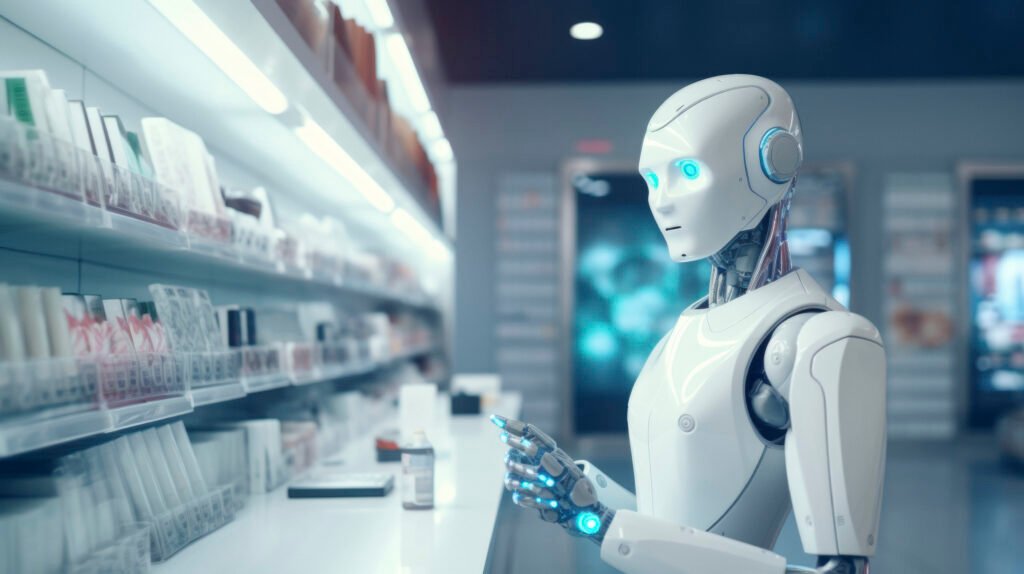
” Artificial intelligence is one of the most promising fields in technology and has the potential to help solve some of the world’s most pressing challenges, including healthcare. “
Mark Zuckerberg, CEO of Meta
2) Future of AI in Education
AI is now being used in education to help teachers, students, and school staff. It takes away the need to do the same things over and over, makes learning better with cool visual effects, and lets more people learn easily. In the future, learning will be more tailored to each student, making it more interactive and fun. There will be a bigger focus on actually doing things, especially in a safer way for lab experiments. Learning is becoming more about using what you know, not just memorizing facts, since information is easy to find and use now. Classrooms are getting smarter, and soon whole school buildings will be smarter, making the whole school a better place.
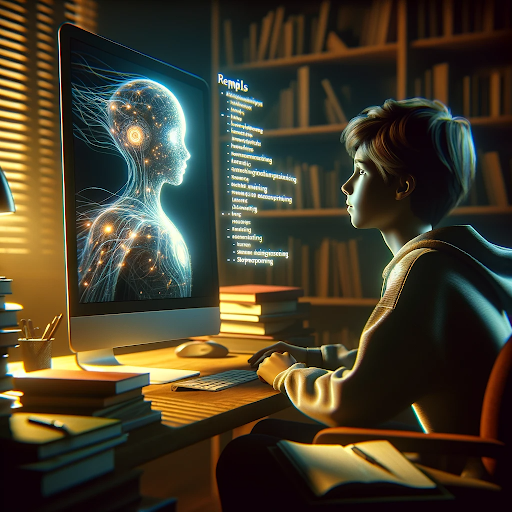
” Education is clearly the foundation for success, and our future depends on innovation and creativity that will come from our students. “
Mark Zuckerberg, CEO of Meta
3) Future of AI in Transportation
The big goal for using AI in transportation is to have self-driving cars and big vehicles. Right now, there aren’t any fully self-driving cars; the ones we have still need a driver to watch over them. AI is being used to make these autonomous cars, improve how we find our way, and manage traffic better. This makes getting around more efficient, safe, and easy. Recently, AI and machine learning have really moved forward in transportation, with companies like Tesla and Waymo working on self-driving car technology.
Looking ahead, AI in transportation is set to make things better and more eco-friendly. It aims to cut down on traffic jams, pollution, and accidents. We’re likely to see lots of new and exciting changes. From cars that drive themselves to smart systems that manage traffic, AI could really change how we travel.
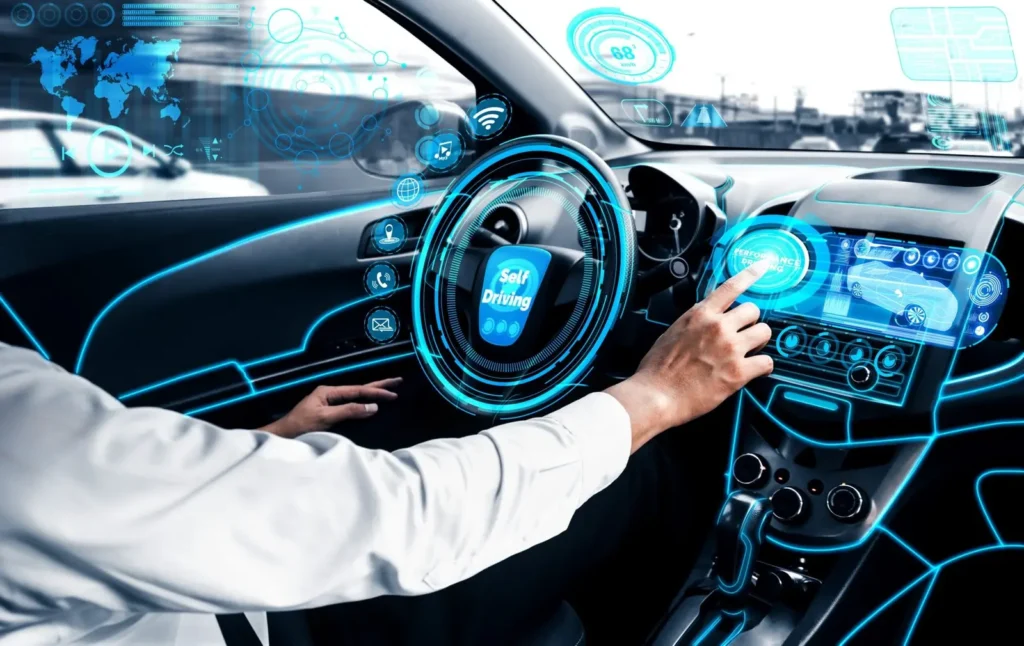
” We will eventually see autonomy and AI be the only option. It will be so much safer than human drive. “
Elon Musk, CEO of Tesla, SpaceX & Twitter
4) Future of AI in Customer Services
AI is making big changes in customer service, with new ideas coming up all the time. It gives personalized and quick help, like chatbots, digital helpers, and understanding human speech. AI chatbots can answer customer questions any time of the day, making answers faster and customers happier.
In the future, AI will make customer service even better and more satisfying. It will be easier and quicker to answer customer questions. We’re going to see lots of new and exciting things. From helpers that respond to your voice to smart systems that can guess what you need, AI could really change how we help customers.
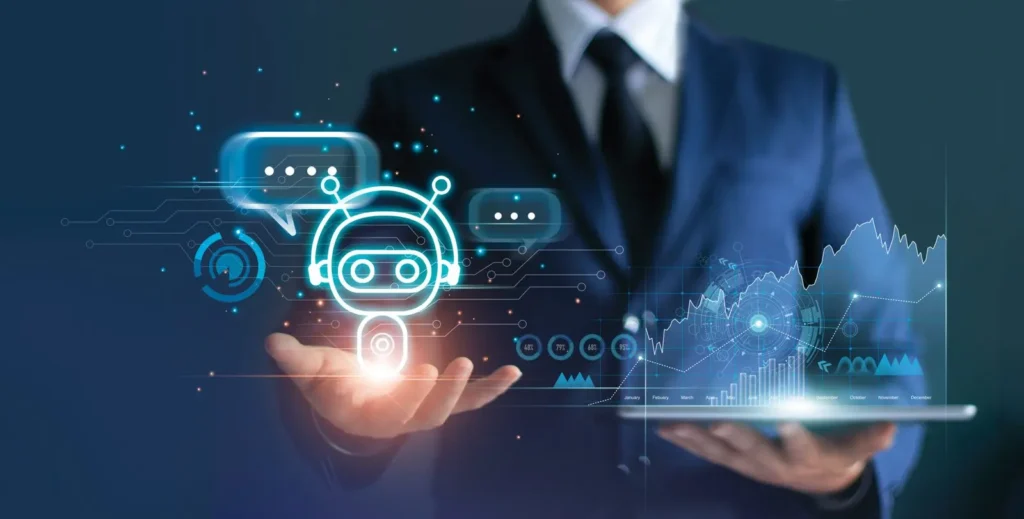
” AI can help to improve customer service by automating routine tasks and providing personalized recommendations. “
Satya Nadella, CEO of Microsoft
5) Future of AI in Marketing
AI is on its way to really changing marketing, with new ideas and big steps forward happening all the time. It uses smart models to predict what customers will do, understands what they need and like, and uses this to make marketing better and more focused. This means reaching the right people at the right time. Making content automatically using these details will lead to marketing that feels more personal, aimed at individual people, not just groups.
Voice searches will get better and more accurate. Also, things like augmented reality, spotting fake activities, and WhatsApp chatbots are going to be big in AI marketing. This means companies can offer better customer service without needing a person to do it.
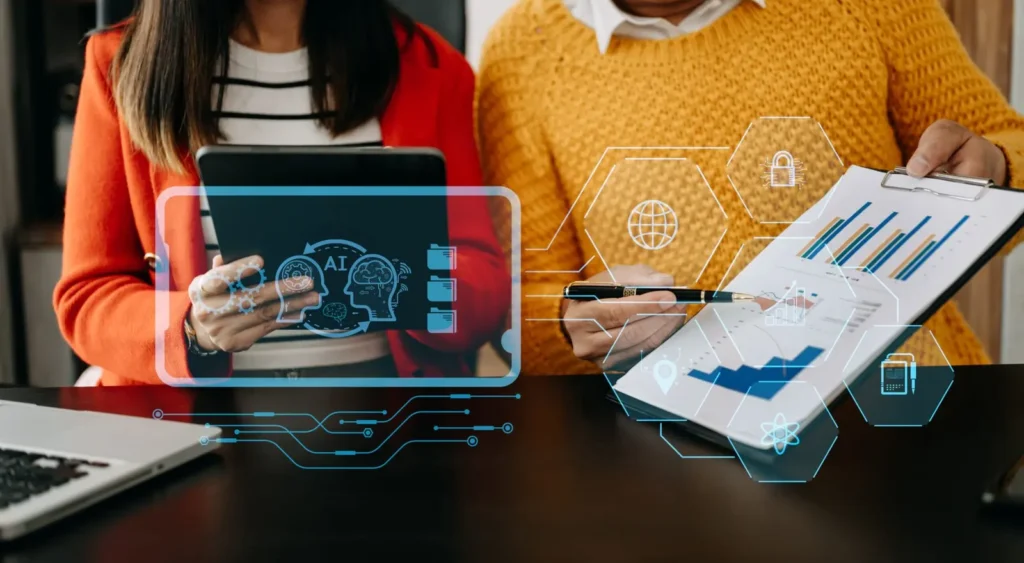
As AI continues to evolve, we can expect to see more intelligent automation in marketing, making it easier and faster to reach our audience. The possibilities are endless, and the future of marketing looks very exciting.
Neil Patel, Co-founder of NP Digital
6) Future of AI in Human Resource Management
AI is making HR jobs easier by doing routine tasks like checking job applications, helping new employees get started, and looking at how well employees are doing. AI chatbots and digital helpers can give quick and right answers to employees’ questions, making less work for HR people. AI is set to make HR work more efficient and better, making it easier and quicker to hire and manage staff. We’re going to see lots of new and exciting changes. AI could really change how we do HR, making it better for employees to be involved and bringing new chances for doing new things and growing.

Cognitive computing is going to be the next big thing in human resource management. It is going to transform how we hire, train, and retain employees.
Ginni Rometty, Former CEO of IBM
7) Future of AI in Banking
AI is helping banks and finance companies in big ways, like finding fraud, automating customer help, and managing risks better. Machine learning can look at a lot of data and give insights about how customers act, credit risks, and good chances to invest. AI is set to make financial services more efficient and accurate, making it easier and quicker to use financial products and services. We’re going to see a lot of new and exciting things. From chatbots that talk to customers to robo-advisors for investing, AI could really change how we use banks and financial services.
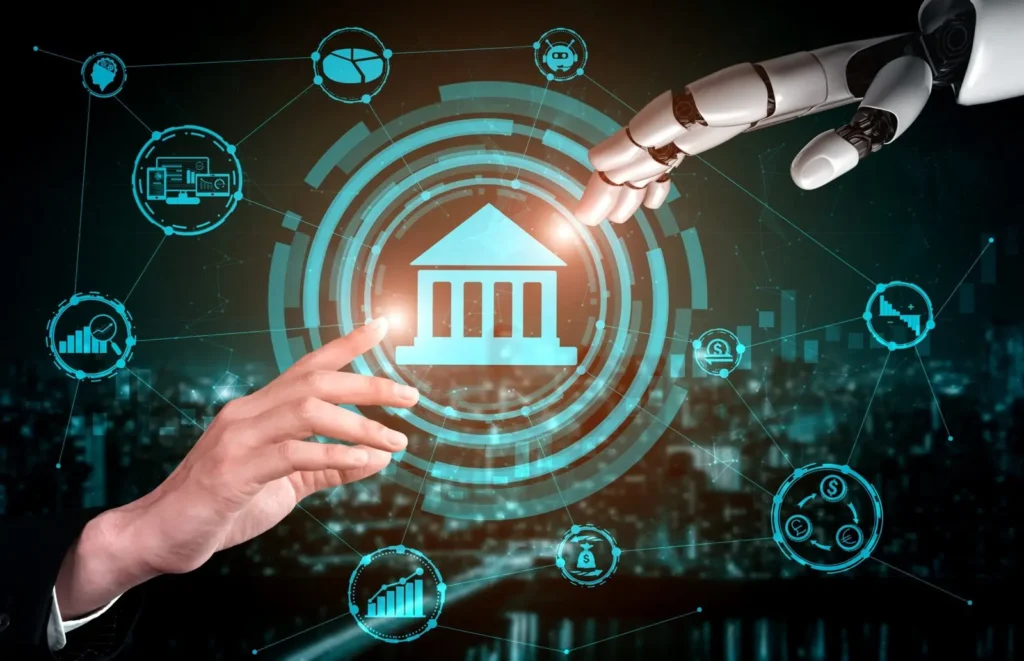
” AI and machine learning will transform every aspect of banking over the next decade. “
Jamie Dimon, CEO of JPMorgan Chase
Common Myths About Advanced AI
Let’s look at some popular myths about advanced AI and how it’s used:
Myth 1: AI’s Accuracy Only Depends on Its Training Data
People think AI’s output is only as good as its data, which can be limited, uneven, messy, and poor quality. But really, AI’s accuracy comes from how it processes data, how problems are set up, using made-up data, choosing specific samples, and setting limits in its models. Also, AI doesn’t just rely on data. The algorithms, human skills, and the computers it runs on are just as important.
Myth 2: AI is as Smart as Humans
AI has done some amazing things, making it seem like it’s as smart as people. But it has limits. It acts based on patterns and instructions, not on its own. For example, an AI that can play a game isn’t necessarily good at making art or writing stories. Scientists are trying to give AI more skills, but making it as smart as a human is still really hard.
Myth 3: AI Will Take Away All Jobs
Some people think AI will make humans jobless. But really, it just changes the kinds of jobs we do, needing new skills. AI has replaced some jobs, but it also creates more interesting work. It makes us more productive and lets us be more creative. We just need to focus on how to use AI best, especially thinking about how it affects the economy and people’s lives.
Myth 4: AI Isn’t Really Important
AI is very useful. It helps manage money, makes predictions, and improves cash flow. It helps businesses grow by making smart plans, improving customer service, and giving warnings at the right time.
Myth 5: Businesses are Better Off Without AI
Actually, AI is really important for businesses to grow and solve problems. It uses smart models to make good predictions and understand business issues. This helps businesses grow a lot and find out what they need to fix.
Myth 6: AI Will Control Humans
It might seem like AI could control us, like in science fiction, but that’s not true. AI works by using specific goals and methods. For AI to control humans, it would need human-like thinking or consciousness. We still don’t fully understand consciousness, so we can’t expect AI to have it. AI is just a tool to help solve complex problems with methods and rules set by humans.
What’s Coming Soon in AI
The future of AI looks really good. It’s going to make things better in learning, health, getting around, and how we find information. We’ll need more people who know a lot about tech and who can solve problems. But we can’t forget the big questions about how AI affects people, like being fair, keeping private stuff safe, and what happens if AI makes a mistake.
Soon, we’ll see even better AI, like new versions of DALLE and new versions of GPT. AI will be used more in businesses for different jobs and talking to customers. The health field will grow with AI too. As AI gets used more, there will probably be new rules to make sure it’s fair and clear how it’s used.
Also Read: The Top 15 AI Tools for Business in 2024 (Both Free and Paid)
AI and Privacy Risks: Simple Points
1. Privacy Worries: We don’t know who gets private info and what they do with it.
2. Job Search Privacy: You might have to share personal details for AI job sites.
3. Who’s Responsible? When data is misused, it’s hard to know who to blame.
4. Consent Issues: Sometimes, there’s no permission asked for collecting or using data.
5. AI Watching: AI could accidentally share secret info, which might help criminals.
6. Unfair Choices: AI might be biased and share data based on its own judgments.
7. Fake Content: AI can make fake pictures or videos that are hard to trace back.
8. Hidden Data Use: Companies don’t always say how they use our data.
9. Cyberbullying Increase: More AI might lead to more online bullying and identity theft.
Frequently asked questions:
Q1. What is the future of AI?
A. AI’s future looks really good. It’s getting better all the time in learning, understanding language, and seeing like humans. AI will make lots of areas better and change how we live and work.
Q2. What will AI replace in the future?
A. AI could take over jobs that are boring and done over and over, so people can do more interesting and creative things.
Q3. What is the future positive of AI?
A. AI will help do things better, faster, and with fewer mistakes in lots of areas. It’s also going to help improve health, education, and taking care of the planet.
Q4. What is the future of AI in 2050?
A. What AI will be like in 2050 isn’t clear yet, but it might be a big part of our lives. AI could help solve many big problems and bring new chances to create and grow. But how we handle big questions and rules about AI will be important too.

